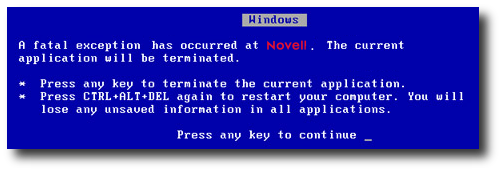08.02.10
Posted in AppArmor, Mono, Novell, OpenSUSE, Samsung, Security at 1:03 am by Dr. Roy Schestowitz

Summary: News about Captivate, AppArmor, SUSE Gallery, and integrating the MeeGo desktop into OpenSUSE
The GPL violator Samsung (which also pays Microsoft for Linux) is finally releasing some source code to Captivate. To quote:
Weighing in at about 161 megabytes, the code should assist developers wishing to work on custom Captivate ROMs. Samsung Captivate owners have been eager to see their first custom builds as the device has sold thousands already since its nationwide launch at AT&T on the 18th.
This is a positive thing from a negative company of corruption and GPL hostility.
Looking over at Novell, what we find is SuperLumin eDir SSO replaceing BorderManager ClientTrust and SUSE is mentioned too.
The announcement is believed to have come at the right time when BorderManager customers are transitioning into the SuperLumin Proxy Cache. Earlier in March, SuperLumin Networks announced its agreement with Novell ( News – Alert) to offer BorderManager customers with a SUSE Linux-based replacement proxy.
Novell’s AppArmor is being merged for the next Linux release even though Novell no longer supports the project.
The following is a summary of changes to the security subsystem for the 2.6.36 kernel, which may be found in my development tree at:
git://git.kernel.org/pub/scm/linux/kernel/git/jmorris/security-testing-2.6#next
SUSE Gallery, which we mentioned before, has free membership now.
Aiming to fulfill part of this industry need, Novell’s SUSE Gallery is a new online showcase for registered SUSE Studio users to publish their Linux-based software appliances and cloud-based applications.
There is also news about Novell’s OpenSUSE 11.3 LiveCD with MeeGo desktop (there are Fluxbox options too).
Andrew Wafaa, the developer working on integrating the MeeGo desktop into openSUSE, has posted information about the current development status on his blog and made a LiveCD image of openSUSE 11.3 with the MeeGo desktop at its current state of integration available to download. Alternatively, users interested in testing out the current development preview can also add the required MeeGo packages to an openSUSE 11.3 system via a one-click install.
There are some new OpenSUSE HOWTOs in a couple [1, 2] of sites [1, 2] and also this summary. We already know that Novell works on putting Mono in MeeGo [1, 2, 3, 4, 5, 6], but this effort seems to be different. MeeGo is one of the least restrictive Linux-based mobile platforms at the moment. It doesn’t need Mono, unless Novell gets its way. █
Permalink
 Send this to a friend
Send this to a friend
05.19.10
Posted in AppArmor, FUD, GNU/Linux, Microsoft, Novell at 3:17 pm by Dr. Roy Schestowitz

Summary: Microsoft employee Crispin Cowen is using his history to opportunistically gain credibility in his irrational public attacks on GNU/Linux communities
Crispin Cowen is one whom we mentioned before as he promoted Microsoft at the expense of GNU/Linux after he had moved from Novell to Microsoft [1, 2, 3]. How much of a role did the paycheck play? There is coverage from Australia today and it’s not flattering to GNU/Linux. Cowen, now a Microsoft employee (for quite some time) is throwing some myths at the AusCERT 2010 crowd (it is not an event for people who support software freedom). To give one introduction:
Dr Crispin Cowen, who for many years was a vocal Linux security guru and Microsoft critic, recently started working for the Redmond-based software giant. His talk on the first day of AusCERT 2010 was titled “Stranger in a strange land: Reflections of a Linux guy in Microsoft Windows”.
Cowen is of course attacking several straw men. We’re used to it because it’s a shameless debating tactic.
It is very typical for Microsoft employees to mischaracterise the criticism of Microsoft, not speaking about the real issues, such as bribery, collusion, and racketeering [1, 2, 3, 4, 5, 6, 7]. How can any sane person defend it?
“It is very typical for Microsoft employees to mischaracterise the criticism of Microsoft, not speaking about the real issues, such as bribery, collusion, and racketeering.”We wrote refutations of the same points before, in response to Microsoft employees who tried to suggest that Microsoft was disliked because “it’s big” or because of its logo (and other petty, imaginary ‘problems’).
These tactics whereby all/most criticism of Microsoft is mischaracterised makes sense to those who use these tactics. It makes them feel good about their decision (and choice) to work for Microsoft when they put things in terms that portray critics as deluded and irrational. These are not victims of circumstance (unlike cases where race or gender get involved as these are immutable). They actually chose to work for Microsoft, knowing damn well what Microsoft had done, or maybe fooling themselves about what Microsoft had done before getting convicted three times. There is a difference between Microsoft’s products and Microsoft the company.
To give one example of Cowen’s disinformation:
“Linux communities are shockingly hostile to women and newbies, attack failures to conform to norms and God help you if you top post,” Cowan said. “Everyone is a butt-head.
It’s always pleasant to see Microsoft employees referring to people as “butt-head[s]” and claiming that GNU/Linux communities — not Microsoft — are the bad guys. Remember what Microsoft’s evangelists teach in their notorious indoctrination sessions: “we are the good guys!” (by “we” they mean Microsoft employees).
Microsoft employees are sometimes intolerant, homophobic, xenophobic, and like everywhere that involves software (general issue among geeks), there is an uneven proportion of females. Microsoft is attacking straw men and daemonising GNU/Linux communities. Well, what else is new? █
Permalink
 Send this to a friend
Send this to a friend
11.01.08
Posted in AppArmor, Mail, Marketing, NetWare, Novell, Servers at 8:43 pm by Dr. Roy Schestowitz

Happy Halloween. Do not evil.
A large number of isolated picks are worth including here. There was nothing major happening at all, but a few mentions of Novell here and there ought to be pointed out for future reference.
Read the rest of this entry »
Permalink
 Send this to a friend
Send this to a friend
10.12.07
Posted in AppArmor, Boycott Novell, Novell, Ubuntu at 12:03 am by Shane Coyle
It has been said on this site before, we do not really hate Novell (certainly not the employees and community), and we absolutely recognize and appreciate all of Novell’s contributions, we just want them to see the error of their ways. Call it tough love, if you will.
So, keeping that in mind, realize I am not particularly comfortable writing about the current layoffs at Novell. However, this story really shocked me, I must admit.
Apparently, Novell has layed off the AppArmor team (and it’s confirmed, so this isn’t like when it appeared that the Samba developers left Novell, but hadn’t – a little embarrassing).
Two years after acquiring the company that developed the AppArmor security software for Linux, Novell has laid off team members behind the project, CNET News.com has learned.
AppArmor’s founder and leader, Crispin Cowan, joined Novell in 2005 when it acquired his company, Immunix, which developed the software. But he and four others from the project lost their Novell jobs in Portland, Ore., on September 28, Cowan confirmed.
However, he plans to continue AppArmor development. He and two other laid-off AppArmor programmers, Steve Beattie and Dominic Reynolds, launched an AppArmor consulting company on Wednesday called Mercenary Linux.
The article goes on to say, from a rather cold economic perspective, that Novell intends to rely on the AppArmor community to lead development of the project since it is an even lower-cost option than outsourcing.
With the adoption of AppArmor really beginning to take off, in my mind, it seems rather odd that Novell would dissociate itself from the core team in such a way – as Cowan put it, "tossing it in the wind and hoping" – yet Novell terms it as "improving our product development process".
What are we to make of this rather sudden, somewhat shocking (even to Crispin Cowan) move? It’s like Novell wanted to embrace the "Bazaar" development model, and just now is going to a bizarre development model.
P.S.
Best of luck to the Mercenary Linux folks (great name, by the way!).
Permalink
 Send this to a friend
Send this to a friend




















 Content is available under CC-BY-SA
Content is available under CC-BY-SA